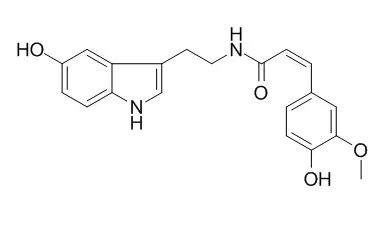The antiproliferative effects of n-hexane, chloroform and aqueous methanol extracts prepared from the whole plant of Centaurea arenaria M.B. ex Willd. were investigated against cervix adenocarcinoma (HeLa), breast adenocarcinoma (MCF7) and skin epidermoid carcinoma (A431) cells, using the MTT assay.
METHODS AND RESULTS:
The chloroform extract displayed high tumour cell proliferation inhibitory activity (higher than 85% at 10 μg/mL concentration), and was therefore subjected to a bioassay-guided multistep separation procedure. Flavonoids (eupatilin, eupatorin, 3'-methyleupatorin, apigenin and isokaempferid), lignans (arctigenin, arctiin and matairesinol), the sesquiterpene cnicin, serotonin conjugates (moschamine and cis-Moschamine), β-amyrin and β-sitosterin-β-D-glycopyranoside, identified by means of UV, MS and NMR spectroscopy, were obtained for the first time from this species.
CONCLUSIONS:
The isolated compounds were also evaluated for their tumour cell growth inhibitory activities on HeLa, MCF7 and A431 cells, and different types of secondary metabolites were found to be responsible for the antitumour effects of the extracts; in addition to moderately active compounds (isokaempferid and moschamine), especially apigenin, eupatorin, arctigenin, arctiin, matairesinol and cnicin exert marked antitumour effects against these cell lines. |






 Cell. 2018 Jan 11;172(1-2):249-261.e12. doi: 10.1016/j.cell.2017.12.019.IF=36.216(2019)
Cell. 2018 Jan 11;172(1-2):249-261.e12. doi: 10.1016/j.cell.2017.12.019.IF=36.216(2019) Cell Metab. 2020 Mar 3;31(3):534-548.e5. doi: 10.1016/j.cmet.2020.01.002.IF=22.415(2019)
Cell Metab. 2020 Mar 3;31(3):534-548.e5. doi: 10.1016/j.cmet.2020.01.002.IF=22.415(2019) Mol Cell. 2017 Nov 16;68(4):673-685.e6. doi: 10.1016/j.molcel.2017.10.022.IF=14.548(2019)
Mol Cell. 2017 Nov 16;68(4):673-685.e6. doi: 10.1016/j.molcel.2017.10.022.IF=14.548(2019)